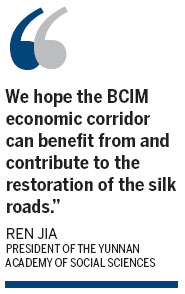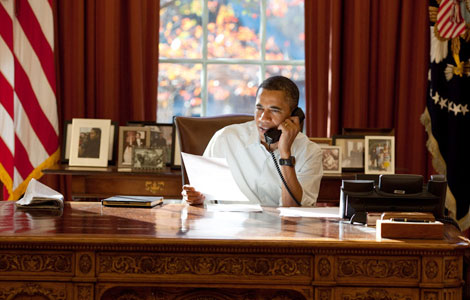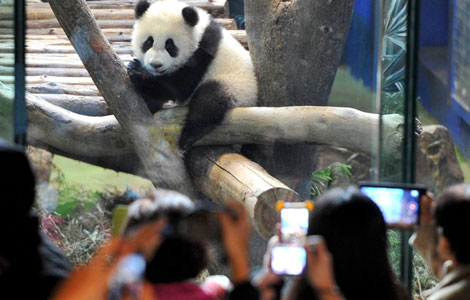Yunnan border trade to get boost from new links
Updated: 2014-01-07 07:19
By Hu Yongqi (China Daily)
|
|||||||||||

Haque MD Shahidul, foreign secretary of the Ministry of Foreign Affairs of Bangladesh, said Bangladesh has a huge market and a young population.
"The advantage of the demographic dividend will encourage investors to start businesses in Bangladesh," he said.
U Htin Linn, deputy director-general of the department of international organizations and economics of Myanmar's Foreign Ministry, said the region has the potential to build the biggest free trade zone in the world based on total population, as well as shared characteristics and values.
Mekong model
Kunming now has air links to Yangon and Mandalay in Myanmar, Dhaka in Bangladesh, and Kolkata in India.
India and Bangladesh also restored rail services between Dhaka and Kolkata. And Myanmar and Bangladesh have signed a construction agreement for a connecting highway.
The priority now is to build a complete and uninterrupted traffic line that goes through Yunnan to India, experts said.
But in comparison, the cooperation involving the greater Mekong subregion seems better-established and follows an agenda.
Newin Sinsiri, unit head of the regional cooperation division of the Southeast Asia department of the Asian Development Bank, said transport projects in the greater Mekong subregion could be an example for the BCIM corridor.
As of December 2012, projects involving the greater Mekong member states had reached $15 billion, with greatly increased physical connectivity as a result of the near-completion of the Trans-Asia Railway, said Sinsiri.
In addition, Sinsiri said the greater Mekong programs had gained from the ability to mobilize substantial financial resources from member states.
For example, China has invested billions of yuan in the Trans-Asia Railway. The Kunming-Bangkok Expressway, which is more than 1,800 km long, has seen thousands of Chinese visitors driving to see the exotic scenery in Laos and Thailand over the past five years.
According to the ADB, the greater Mekong group has built effective institutional arrangements such as a leaders' summit at the political level, ministerial conferences supported by senior officials' meetings at the policy level, sector forums and working groups at the program and operational levels and secretariat support from the ADB.
Sinsiri said the ADB regards collective political will and commitment as the crucial factor in regional cooperation.
The greater Mekong countries are now firmly on the world tourism map and a sustainable tourism industry is being strengthened with the effort of each country, an ADB report said.
As for environmental protection, the greater Mekong project has laid the foundation for long-term, enduring development through the Core Environment Program and Biodiversity Corridors Initiative.
However, the anonymous NDRC official said there's a long road ahead for cooperation between China and the other three countries.
"Political trust is another thing that we have to consider in the meeting, and we have put poverty relief and welfare of the local residents on top of the agenda.
"In this way, our neighbors will be convinced China has no ambition to suppress their development but aims at a win-win situation," the official said.
Gautam Bambawale, director-general of the East Asia department of the Indian External Ministry, said economic cooperation is being discussed separately from the boundary dispute between China and India, which should not be an obstacle to economic cooperation.
U Htin Linn said Myanmar has struggled with ethnic factions in the north, while the central government is working to keep border trade uninterrupted. "The Myanmar government will treat all people equally and focus on the progress of ethnic groups. In the next year, everything will return to normal in northern Myanmar, and trade and investment will also improve," said U Htin Linn.
Zhang Xiaoqiang, vice-minister of the NDRC, said the four countries are at different stages of development, and every phase of cooperation is based on mutual respect and trust.
"There will be more collaboration in procedures such as customs checks, quality inspections and quarantine. The ultimate purpose is to establish long-term facilitation of trade, personnel and currency exchanges," Zhang said.
(
Related Stories
Manzhouli Sino-Russian Border Trade Zone 2013-12-17 15:30
China-India border trade booms 2013-12-11 22:21
Yuan cross-border trade settlement hits 8.6t 2013-11-02 09:26
Border trade center serves as China's gateway to Kazakhstan 2013-09-09 08:44
China builds on border trade 2013-03-04 09:30
Today's Top News
Merkel fractures pelvis skiing, cancels visits
Portugal declares three-day mourning for Eusebio
Forbidden City to be closed every Monday
Icebreaker prepares for breakout
Beijing rejects Abe's call
Illegal ivory stash destroyed
Israeli ex-PM Sharon's condition in steady decline
Yahoo says ads in Europe spread malware
Hot Topics
Lunar probe , China growth forecasts, Emission rules get tougher, China seen through 'colored lens', International board,
Editor's Picks

|

|

|

|

|

|





